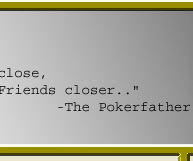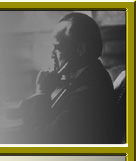(Click Here for the Latest Online Poker News Stories)
Copyright 2004 Haymarket Publishing Services Ltd
Management Today
November 5, 2004
HEADLINE: Putting the Bling in UK gambling
BODY:
Shaken up by the advent of easy-access online
betting, the gaming
industry is now about to be swept along in a gold rush as the
new Gambling Bill
brings Las Vegas-style casinos to Britain's big cities. Who stands
to win in this betting revolution? Nils Pratley reports.
Elaine dela Cruz, a 25-year-old working in
advertising sales for a magazine publisher, is part of the new
breed of British gambler. Twice a week she plays online poker
from her computer at home, generally entering mini-tournaments
of 10 people at pokeroom.com. Each player puts up dollars 100
plus a dollars 10 rake for the house; the winner collects dollars
700, the second and third-place finishers get dollars 200 and
dollars 100 respectively.
Poker
is a game that rewards skill over luck in the long term and dela
Cruz is clearly a talented player. She calculates that in the
past year she has made about pounds 12,000 on pokeroom.com, enough
to fund a lifestyle beyond her income.
Her salary, she says, pays the everyday things
in life, such as the mortgage and utility bills; her poker winnings
fund the luxuries, like evenings out in London nightclubs, spa
visits and even a recent shopping trip to New York. 'I have always
known since I was young how to play
poker and games derived
from it, ' she explains. 'But I only started to get into it online
after my boyfriend started playing for play money (virtual money
offered by online sites for players to practise). I was the first
to say, let's play for real
money and up the stakes a little bit.
'For me, it is definitely a hobby and a way
to get extra cash. It's about affording a few luxuries and being
able to go out when I want. That's why I do it. In the job I am
doing at the moment, there is no way I could afford a trip to
New York, for example.'
If dela Cruz is a rare example of a successful
gambler, such successes help to explain why, in the face of much
government and media concern about addiction, gambling in Britain
is an extraordinary growth story.
Moreover, it may be only in its infancy. The
government's Gambling Bill, now being debated by parliament, is
likely to be the trigger for the next stage of
expansion: the creation of Las Vegas-style casinos in most major
cities across the country.
As investments, they look a decent bet, given
the speed at which internet gambling has taken off. Ladbrokes,
for example, a relative late-comer to the online
world, now has 1.2 million registered customers, about 250,000
of whom it classes as active. John O'Reilly, its managing director
of e-gaming and telephone betting, reckons patrons split roughly
equally three ways: traditional sports betters; players of casino
games such as roulette; and poker
players.
Within the latter category, he points to a
surprising source of players.
'Students generally don't have enough money
and have time on their hands.
They used to get jobs behind a bar; now they sit down at a computer
playing online poker.
The new breed of successful poker player is in his or her late
teens, has got a good mathematical brain and is quick-witted.'
IG Index, the financial spread-betting firm,
also reports increasing diversity among its punters. Its clients
are still predominantly City types, such as the ex-dealer who
reputedly made pounds 500,000 in a six-month period this year
by trading oil via futures and options. But one of its most successful
gamblers is a greengrocer who has shown an unerring ability to
trade commodities, such as the price of orange juice and timber.
Commodities seem to have replaced dot.com
stocks as the gamble of choice for financial betters. 'Share prices
going from pounds 4 to pounds 20 in a few days have disappeared,'
says IG's senior quoting dealer Will Armitage, 'but what has not
gone away is the desire to make quick money.'
For companies such as these, the British appetite
for sophisticated gambling is good business. O'Reilly's division
reported a 45% rise in gross win - effectively, gross profit before
operating costs - to pounds 44.7 million within Ladbrokes' latest
set of interim results.
Given that, according to O'Reilly, the capital
employed within the division is a mere pounds 20 million or so,
it already ranks as a lucrative investment.
Yet the revolution in the bookies' shops is
equally dramatic. Anybody who has visited one in the past year
will have noticed the arrival of machines that the bookies call
fixed-odds betting terminals (FOBTs). These offer a range of casino
games, but roulette accounts for about 90% of their turnover.
In the past few years, the big five bookies - Ladbrokes, William
Hill, Coral, Stanley Racing and the state-owned Tote - have installed
about 15,000 such machines in their shops and it is estimated
that about pounds 290 million a week is being wagered through
them by the British public.
The figure is slightly misleading, because
much of the stake money is returned to the punter and then recycled
through the machine several times.
Even so, roulette, as played in high street
shops, can claim to be Britain's most popular gambling product
- pounds 290 million is more than three times the average weekly
National Lottery ticket sales of pounds 88 million.
To many, gambling on roulette seems pure madness,
a guaranteed way for most people to lose money. The house's advantage
is in-built and staring the punter in the face - that horrible
green zero. But, says O'Reilly, the fact that roulette is pure
luck is the base of its appeal. Unlike betting on horses, for
example, the average punter need not fear that he suffers from
lack of inside information or experience. 'It's the psychology
of getting lucky. In games like roulette there is no need for
skill and judgment. Everybody's equal.'
The National Lottery itself, where the odds
are far inferior to those on the roulette wheel, has broadened
the appeal of games of pure chance, he believes.
'We were always a nation of gamblers, but I think the National
Lottery has made it acceptable to be a gambler because the government
is promoting it.'
The Lottery looks like a mere warm-up for
the government's next piece of liberalisation, the Gambling Bill.
Andrew McIntosh, the minister for gambling, says it 'will move
gambling conclusively into the mainstream of the leisure industry'.
Critics say it will increase the number of gambling addicts in
Britain from 300,000 to 700,000.
The bill covers the full range of gambling,
from internet sites
to betting exchanges, but the most explosive element involves
casinos. A study by Goldman Sachs estimated that some pounds 6
billion could be invested in casinos in Britain and that the number
of premises could more than double to 280-300.
Many of the protections of the old 1968 Gambling
Act - deeply resented for decades by the casinos as nannyish -
will be repealed under the new bill. Casino operators will be
allowed to advertise for the first time and punters will no longer
be obliged to become members at least 24 hours before they enter
the premises. In theory, access will be easy as entering a pub.
The biggest change of all will be the arrival
in Britain of slot machines offering huge prizes. These are the
so-called category-A machines, with potentially unlimited prizes,
that populate the big Las Vegas casinos.
Indeed, they are the economic foundation of
those operations: forget any idea that Vegas is chiefly about
high-rollers in dinner jackets playing blackjack and baccarat;
jackpot slot machines account for about half the turnover of the
big gambling palaces in Vegas. Many of them have at least 2,000
such machines, each clunking away around the clock.
Category-A machines look a bit like old-fashioned
one-armed bandits, or AWPs
- amusement with prizes, as the industry calls them. The difference
lies in the possibility that the next turn of the wheel could
produce a huge win, says Russell Hoyle, chief executive of Leisure
Link, one of Britain's biggest manufacturers and distributors
of gaming machines.
'They are much more about putting money in,
turning the wheel quickly and trying to win substantial amounts
of money. They are also genuinely random. An AWP in the UK at
the moment is random to within 10,000 turns, which means that
it has the ability to compensate for heavy losses. A category-A
jackpot machine has been tested to be random within one million
turns, which means statistically that a player has the same opportunity
as any other to win the jackpot.'
Category-A machines can also be linked together
via 'progressive jackpots', whereby a few cents from each turn
of the wheel is skimmed off into a separate prize pool that can
grow to astonishing size. One player in Vegas last year collected
dollars 37.5 million from such a jackpot.
The other key point about these machines is
that they offer significantly better odds than one-armed bandits.
In Vegas, category-A machines tend to be programmed to return
more than 90% of the cash inserted into them, a ratio designed
to keep the player playing. The machine wins in the long run,
of course, but the payout is a better deal than the sub-80% ratio
on current AWPs in Britain.
Category-A machines are regarded as so central
to the shape of the casino industry in Britain that they have
generated more debate and lobbying effort than any other aspect
of the Gambling Bill. There are two key issues: which casinos
should be allowed to offer them; and how many is appropriate?
On one side, the current UK operators - led
by Gala, Rank and Stanley - have argued that category-As should
be allowed in all casinos, regardless of size.
That certainly seemed to be the idea of Sir Alan Budd, whose review
of the gambling laws paved the way for the bill.
Culture secretary Tessa Jowell, however, has
rejected the idea as too much, too soon. She wants category-A
machines to be be restricted to casinos of over 5,000 sq m - what
the bill calls regional casinos. Most existing casinos in Britain
fall below that size threshold and would be classified as 'large'
casinos; these will be restricted to offering category-B machines
with much smaller jackpots.
The big boys - the operators of the regional
casinos yet to be built - look set to be allowed to operate up
to 1,250 category-A machines in each casino, which in theory should
be enough to ensure that their premises stand comparison with
those in Vegas.
Jowell's reasoning is that limiting the distribution
of jackpot machines will allow a controlled assessment of the
impact on gambling addiction in Britain.
To cynics, this view owes much to the government's
wish to placate the anti-gambling lobby and sceptical elements
of the media.
Established British casino operators think
an unfair playing field will be created, and Leisure Link's Hoyle
has sympathy with them. 'This is delivering the UK gambling market
to international operators and I don't know why any government
would want to do that, particularly as for the last 40 years it
has had a highly responsible, crime-free industry that employs
100,000 people,' he says. 'The international operators have got
it game, set and match.'
Certainly, the overseas entrants seem already
to have embarked on a land grab. Sol Kerzner's South African group
Kerzner International aims to build on land next to the Millennium
Dome in London and at similar sites in Glasgow and Manchester.
The Las Vegas company behind Caesar's Palace plans to create a
pounds 320 million gambling complex next door to the new Wembley
Stadium.
The Gambling Bill has also attracted the biggest
beast in the jungle, MGM Mirage of the US, a dollars 6.5 billion
company that owns eight - roughly half - of the huge gambling
hotels on the strip in Vegas, including the Mirage, Bellagio,
New York New York and MGM Grand. The company does not do things
in small measures: 18 original paintings by the modern master
hang on the walls of its Picasso restaurant in the Bellagio.
MGM Mirage has already signed a series of
deals to build casinos: with the Olympia conference centre in
London; with Newcastle United, to construct a casino next to the
football ground; with British Land, to build next to the Meadowhall
shopping centre in Sheffield; and with property group Peel Holdings
in Liverpool, Manchester, Salford and Glasgow.
'This is not pie-in-the-sky,' says Lloyd Nathan,
the group's managing director for Europe and a Brit who has spent
most of his career in the US. 'We have real money on the table
already and hope to be a sizeable investor if this bill goes through
and if the future tax regime proves workable. We are looking at
opportunities daily.'
He estimates MGM Mirage's planned project
costs to date at dollars 2 billion and that 30,000 jobs, split
between direct employment and construction jobs, will be created.
Such numbers tend to impress governments, although Nathan is keen
to avoid the charge from the British operators that a slick lobbying
campaign from the Vegas invaders has won the day. 'UK-based operators
have said that this is anti-competitive and discriminates against
domestic operators in favour of international operators. I struggle
to see the logic,' he says.
He talks of MGM Mirage as a good corporate
citizen, recruiting staff from disadvantaged social backgrounds
and trying to take casinos up-market.
Gordon Ramsay, he suggests, will be in demand
as a restaurateur to the new casinos-cum-leisure complexes. 'We'd
hope in this country to appeal to everybody from 18 to 80, male
and female, and provide both non-gambling and gambling entertainment.'
A note of caution is needed, though, argues
Chris Guyvor, managing director of Quintus, an industry adviser
to several gambling operators. The revolution will not be instant
and there will be major uncertainties even if the Gambling Bill
becomes law. 'This is not deregulation or liberalisation; it is
re-regulation of outdated laws. I don't think it's a free-for-all.
Look where the Government is coming from politically: it wants
to guarantee there will be no increase in problem gambling as
a result of this bill, so it is going in for armour-plating.'
The Government's big fear, he says, is that
it repeats the disastrous gambling experiment in Australia, where
pubs and bars were given enormous lattitude to install slot machines
and problem gambling exploded.
Certainly, the rise of roulette via bookies'
FOBTs seemed to create panic at Jowell's department. The Government
contemplated legal action, but seemed to be deterred by the industry's
argument that FOBTs were not actually gaming machines, which are
not permitted in betting shops. FOBTs, said the bookies, were
vehicles for placing bets on an event taking place elsewhere,
given that the spin of the wheel happens on a central computer.
Jowell settled for a voluntary code limiting the bookies to four
machines per shop. Her revenge seems to be the substantial reversal
of the deregulatory spirit of the draft bill, particularly with
regard to category-A machines.
'It is a complete misnomer to look at the
UK market as the next Vegas,' says Guyvor. 'There will still be
restrictions of numbers of machines; there will still be considerable
planning hurdles, and we do not know how local authorities are
going to react; and it also rains in the UK. Over a 10-year period,
we might have 30 resort casinos. We will not see a proliferation.'
The biggest unknown is the tax regime. All
the big US operators make the point that a marginal tax rate of
40% of gaming profits, which currently applies to casinos earning
over pounds 4.5 million a year, would make their plans uneconomic.
The British Casino Association is lobbying for 15%, still above
the rates of 8% and 9% seen in Nevada and New Jersey, but the
Treasury has yet to drop any clear hints on what it would regard
as acceptable.
The Treasury, then, is sitting on the nuts,
as they say in poker. But chancellor Gordon Brown probably already
knew that: arguably, his abolition of the unpopular duty on bets
in 2001, replacing it with a tax on bookies' gross profits, has
been the single biggest driver of increased gambling in Britain.
Certainly, it seems to have been a big factor behind the popularity
of roulette machines, which have been a major contributor to the
fourfold leap in betting industry turnover since 2001 to pounds
29.1 billion, according to Customs & Excise figures.
Will Brown now press the button for the next
gambling revolution? Nobody knows for sure, but the idea of increased
revenues and huge inward investment
sounds like the type of gamble that appeals to governments.
THE BRITISH BETTING BOOM
Total Annual
stakes growth
pounds
1999 7.5bn
2000 7.4bn -1%
2001 8.8bn 18%
2002 16.6bn 90%
2003 29.1bn 75%
Source: Customs & Excise Annual Report 2004 (excludes casinos,
bingo and slot machines)
A MILLION POUND PUNT ON PERFORMANCE
The desire to take great risks in anticipation
of even greater potential reward is inherent in both inveterate
gamblers and successful business people, as many a racehorse-owning
entrepreneur would testify. But the link between bookies and the
boardroom is rarely as direct as in the case of clothes retailer
Next, whose directors recently took a multi-million pound punt
on their own future share price.
The company's directors and top managers are
staking a total of pounds 1.5 million of their own money, a further
pounds 2 million coming from special bonuses paid for the purpose
of placing the bet. The money has been invested in warrants issued
by Goldman Sachs, and could result in the 20 senior staff at Next
sharing a pounds 13 million pot at the end of July 2008. This
maximum payout will be achieved only if shares reach pounds 24.50,
but they must average more than pounds 20 for three months for
the warrant-holders to receive any return on their investment.
This unconventional way of rewarding performance
seems to have the blessing of major shareholders and the Association
of British Insurers, and its simplicity and cost-effectiveness
in comparison with alternatives like share options may well appeal
to other boards.
(Click Here for the Latest Online Poker News Stories)
|






